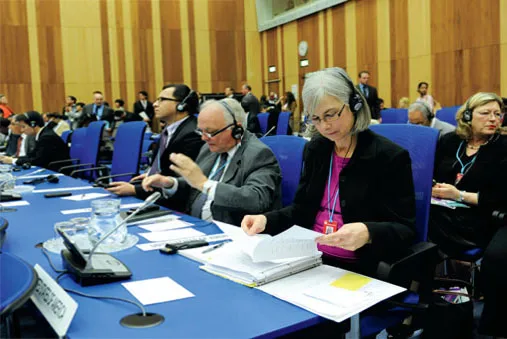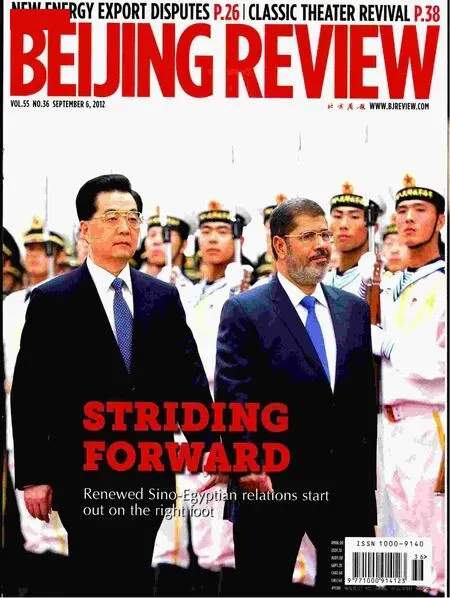Keeping the Peace
Keeping the Peace
At present, the international security situation has become more complicated, while the process of international arms control and disarmament remains at a standstill. Li Changhe, a senior advisor of the China Arms Control and Disarmament Association and a former ambassador of disarmament affairs, recently spoke to Beijing Review reporter Chen Ran in an exclusive interview, sharing his views on China’s role in nonproliferation and arms export control. Edited excerpts follow:

Beijing Review: How do you see the current state of international arms control and disarmament?
Li Changhe: Arms control, disarmament and nonproliferation of weapons of mass destruction are essential elements of contemporary international relations and security, involving fields such as politics, defense, trade, science, technology and law. They are directly relevant to national security interests as well as world peace and stability. Therefore, the international community has attached great importance to this complex and sensitive issue.
In the 21st century, international arms control and disarmament remain in the doldrums despite the progress the international community has made.
On April 5, 2009, U.S. President Barack Obama pledged to lead a quest for a world free of nuclear weapons in a speech in Prague, aiming to reduce the importance of nuclear weapons in the U.S. national security strategy. However, Obama’s proposal has made no difference to the United States, as the country has well developed modern weapons beyond nuclear forces, particularly the anti-missile system. On April 8, 2010, the United States and Russia signed the New Strategic Arms Reduction Treaty, which is a significant step in nuclear disarmament since the Strategic Arms Reduction Treaty in 1991.
Since the second half of 2010, international arms control and disarmament have once again bogged down. The entry into force of the Comprehensive Nuclear Test Ban Treaty still needs a long process. The Geneva-based Conference on Disarmament, the single multilateral disarmament negotiating forum, has not been able to carry out substantive work on issues such as the prevention of an arms race in outer space over the past 15 years. Regional nuclear issues in Iran, North Korea and other places are still pending. In early July, countries began the negotiation of the Arms Trade Treaty at the UN, designed to formulate the first binding treaty to control the exports of conventional weapons. With no agreement reached, the treaty will be delivered to the 67th session of the UN General Assembly later this year. And I believe for now, it is very difficult to reach such a binding treaty.
The complexity of the international security situation, the rise of unstable and uncertain factors, and the lack of adequate strategic mutual trust and sense of security between nations, especially between powers, are the root causes that hinder international arms control and disarmament. What’s more, the Cold War mentality still exists in some places. Strategic competition over international order, comprehensive national strength and geopolitics also becomes increasingly fierce. All of these will accelerate further military rivalry. Under the current circumstances, what can China do to boost the stagnant international arms control and disarmament process? China has kept an independent but cooperative stance on international arms control. It has participated actively and constructively in the activities of international arms control and disarmament as well as nonproliferation, advocating fair and reasonable arms control rules.
China is one of the five nuclear-weapon states under the Nuclear Nonproliferation Treaty, which also include the United States, Russia, France and Britain. Its nuclear arsenal, however, is the smallest among the five. Since reform and opening up started at the end of the 1970s, China’s national strength as well as its defense capacity have made much progress. China pursues an independent foreign policy of peace. It therefore focuses its military strategy more on defense than offense and keeps a minimum nuclear deterrence.
China has promised never to be the first to use nuclear weapons at any time and under any circumstances. What’s more, it has made the unequivocal commitment that under no circumstances will it use or threaten to use nuclear weapons against non-nuclear-weapon states or nuclear-weapon-free zones. All these have amply demonstrated that China’s nuclear weapons are for self-defense.
China is against an arms race and will not involve itself in an arms race. Regarding international nonproliferation, China has always supported the international community’s efforts toward the nonproliferation of weapons of mass destruction. China doesn’t support Iran and North Korea’s attempts to obtain nuclear weapons. China aims to resolve the nuclear issues of the two countries through peaceful talks.

A GLOBAL CAUSE: Delegates attend a preparatory session for the 2015 Nuclear Nonproliferation Treaty Review Conference in Vienna on April 30
In the meantime, China shares a lot in common with Western countries on issues such as achieving a nuclear-free world, supporting nuclear-weapon-free zones and restricting arms exports. But there are differences. The West sometimes uses the prevention of the proliferation of weapons of mass destruction as a tool to serve the interests of their foreign policy and even use it as an excuse to overthrow the government of a sovereign state. China is totally against such practices.
China adheres to three principles in arms exports—contributing to recipient countries’legitimate defense capability, not harming the peace and stability of regions concerned and the world, and not interfering in the internal affairs of recipient countries
What’s your take on the prospect of the denuclearization of the Korean Peninsula? There is still a long way to go. The key point of the North Korean nuclear issue is that Washington and Pyongyang severely lack strategic mutual trust. Pyongyang has been in fear of the strong threat from Washington’s denouncing Pyongyang as an “axis of evil”power and planning to topple it. North Korea takes this as a reason for its nuclear weapon program. Therefore, only if mutual trust is built between the two sides, will North Korea swallow all its doubts and soften its stance on the issue.
It is not true that China can exert a special influence on North Korea. What China can do is to bring parties concerned together for talks. The solution lies in North Korea and the United States.
The six-party talks, which were initiated in August 2003, have played an important role in preventing the deterioration of the North Korean nuclear issue and severe conflicts on the Korean Peninsula.
Now, the most urgent problem is to resume the six-party talks, which were suspended prematurely in 2009. A direct dialogue between Pyongyang and Washington could be another important approach to resolving the issue.
What is the weapon export control system like in China? What policies and measures have China adopted to ensure weapons won’t be sold to conflict-ridden areas? All military exports in China should go through stringent examination and approval by China’s Central Government. Authorized by the State Council and the Central Military Commission, the State Administrative Committee on Military Products Trade (SACMPT) is in charge of China’s military exports while its executive body, the State Bureau of Military Products Trade, implements the supervision and management of military exports.
China has adopted a prudent and responsible attitude toward the export of military products. It adheres to three principles in arms exports—contributing to recipient countries’legitimate defense capability, not harming the peace and stability of regions concerned and the world, and not interfering in the internal affairs of recipient countries.
Military export licenses are authorized by SACMPT. Organizations without authorization are not allowed to export military products. Individuals are prohibited to engage in military export. The Chinese Government has adopted rigorous measures for military export control, and has kept making improvements in light of the changing situation.
What should the Chinese Government do to improve China’s current arms control and disarmament system?
Arms control and disarmament are important approaches to achieving the UN objective of safeguarding world peace.
After years of practice, China has established fruitful diplomatic coordination mechanisms on international arms control with the involvement of many sectors including foreign affairs, national defense, international trade, military industries as well as research institutes. At present, there are lots of experts and researchers working in the field.
In the future, related departments should further strengthen their efforts, deepen coordination and train more competent professionals for arms control research.

